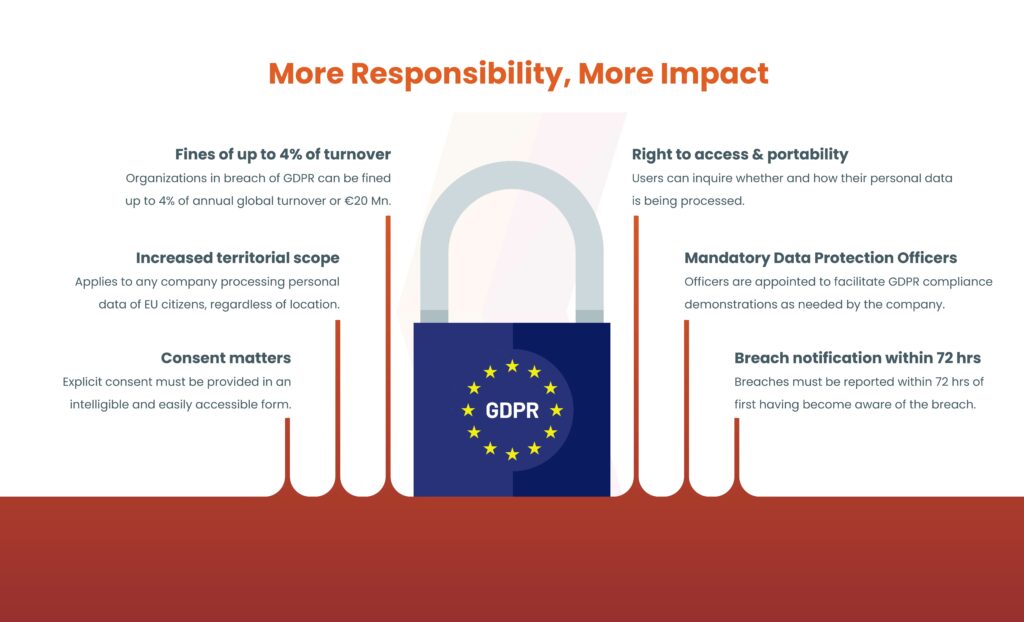The widespread adoption of cloud services has introduced cybersecurity challenges and compliance complexities due to various privacy regulations in different jurisdictions. According to Pew Research Center, 79% of respondents expressed concerns about the collection and processing of their personal data by companies and government entities. Customers relying on multiple cloud providers have limited control over their data as it flows across different data centers, leading to heightened concerns about data protection and security. The General Data Protection Regulation Act mandates that companies processing the personal data of EU citizens adhere to specific guidelines for collecting, storing, and utilizing information, impacting B2B and cloud-hosted companies significantly.
Table of Contents
What is General Data Protection Regulation Act?
The GDPR aims to increase individuals’ access to personal data. This is aimed at standardizing data protection practices across the European Union or EU. Organizations need to first comprehend the main requirements and rules of the legislation. In order to gain a better understanding of compliance, one must ensure obtaining well-informed consent and provide a transparent account of the data processing activities. It is crucial to improve data quality and accuracy as well as to implement security measures. This would help to guard against loss, theft, and unauthorized access. It mandates that companies conducting extensive data processing and subject monitoring appoint a data protection officer (DPO). This DPO oversees the company’s data governance and compliance responsibilities.
Non-compliant companies can suffer from legal penalties including fines of up to 20 million euros (approximately $22.07 million) or 4% of annual global revenue. Furthermore, the DPO ensures the application of appropriate data protection principles for maintaining personal data.

Purpose of General Data Protection Regulation Act
GDPR aims to protect the EU population and their data by ensuring responsible data collection, storage, and processing. It mandates the secure handling of Personally Identifiable Information (PII) to protect against unauthorized access, damage, or loss, including threats like ransomware and malware. GDPR limits the purposes for which personal data can be collected, emphasizing necessity and legitimacy. Organizations must obtain explicit consent or have lawful reasons to process personal data, ensuring accuracy and regular updates.
Who must Comply with GDPR?
The goal of implementing General Data Protection Regulation is to establish a single EU data security law across member states, eliminating the need to create and enforce separate data protection laws. Furthermore, despite originating from the EU, G extends its jurisdiction to global businesses operating outside the region.
For example, it applies to a U.S. based company in the EU and managing the data of residents and citizens. According to a PwC survey, 92% of U.S.-based companies prioritize GDPR data protection.
Additional compliance-specific criteria include:
- Operations within European Union country
- Organizations that handle data of EU residents, regardless of their location within the region.
- A company with a workforce of around 250+ employees.
- Companies whose data processing affects the rights and freedoms of data subjects, regardless of employee count, and may involve certain types of personal data.
Book Your Free Cybersecurity Consultation Today!
Data Breaches with Heavy Penalties
- British Airways received a €20 million fine from the ICO for an “unacceptable” failure to protect its customers, marking the largest penalty imposed by the ICO to date. The significant breach in 2018 resulted in the theft of booking details of over 400,000 individuals.
- Marriott Hotels incurred an £18.4 million fine due to a data breach impacting more than 339 million hotel guests. The breach initially occurred in 2014 within the Starwood Hotels group, which Marriott acquired two years later. The hacker maintained access to affected systems until 2018, compromising personal data such as names, email addresses, phone numbers, passport details, VIP status, arrival and departure information, and loyalty program numbers.
GDPR regulations include even the largest global internet companies. While smaller businesses may face lesser fines, they are held to the same high standards.
What Happens if Organizations Fail to Comply with GDPR?
Failing to comply with General Data Protection Regulation guidelines can have serious consequences for organizations. It is crucial for businesses to prioritize GDPR compliance to mitigate the risks.
Financial Penalties
Businesses that breach GDPR and experience data breaches face substantial fines. The maximum penalty can reach 4% of the company’s annual global turnover or €20 million. In contrast, under the Data Protection Act, the maximum fine for failing to prevent a data breach was significantly lower: £500,000.
Damage to Reputation
Hampered reputation can impact business relationships, customer loyalty, and overall brand perception, affecting long-term success and sustainability. Therefore, organizations must prioritize proactive measures to uphold GDPR compliance and safeguard their reputation.
Remuneration for Damages
According to General Data Protection Regulation, one has the right to seek compensation for tangible or intangible harm resulting from breaches of the guidelines. Significant violations could lead to an increase in compensation claims.
Get in!
Join our weekly newsletter and stay updated
Conclusion
General Data Protection Regulation (GDPR) represents a fundamental shift in data protection practices, aiming to standardize and strengthen privacy rights across the European Union (EU) and beyond. By establishing strict guidelines for data collection, storage, and processing, GDPR emphasizes transparency, accountability, and security in handling Personally Identifiable Information (PII). The regulation applies not only to EU-based organizations but also to global businesses that handle the EU’s data, reflecting a unified approach to data security.
Failure to comply with the General Data Protection Regulation can result in severe consequences, including substantial fines, reputational damage, and compensation claims. This underscores the critical importance for organizations to prioritize GDPR compliance, implement robust data protection measures, and foster a culture of privacy and accountability. Ultimately, GDPR aims to restore trust in data handling practices, empowering with greater control over their personal data, and ensuring a harmonized approach to data privacy across borders in the digital era.
As a CERT-In empanelled organization, Kratikal is equipped to enhance your understanding of potential risks. Our manual and automated Vulnerability Assessment and Penetration Testing (VAPT) services proficiently discover, detect, and assess vulnerabilities within your IT infrastructure. Additionally, Kratikal provides comprehensive security auditing services to ensure compliance with various regulations, including ISO/IEC 27001, GDPR, PCI DSS, and more, assisting your business in adhering to legal requirements set forth by diverse governments.
FAQs
- What are the 4 key components of GDPR?
Ans: The 4 key components of GDPR are:
Data Protection Principles.
Rights of Data Subjects.
Legal Bases for Data Processing.
Responsibilities and Obligations of Data Controllers and Processors. - What is the purpose of GDPR Compliance?
Ans: The purpose of GDPR compliance is to protect the personal data of an organization. It also aims to establish robust measures for data privacy and security across the European Union.








Leave a comment
Your email address will not be published. Required fields are marked *